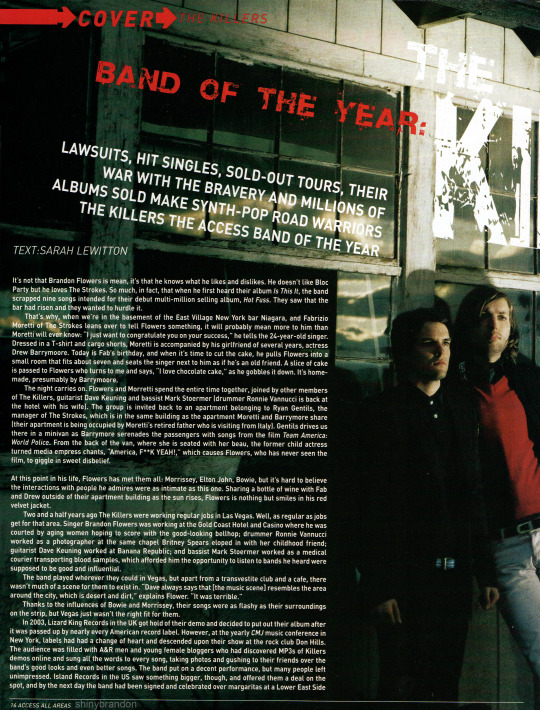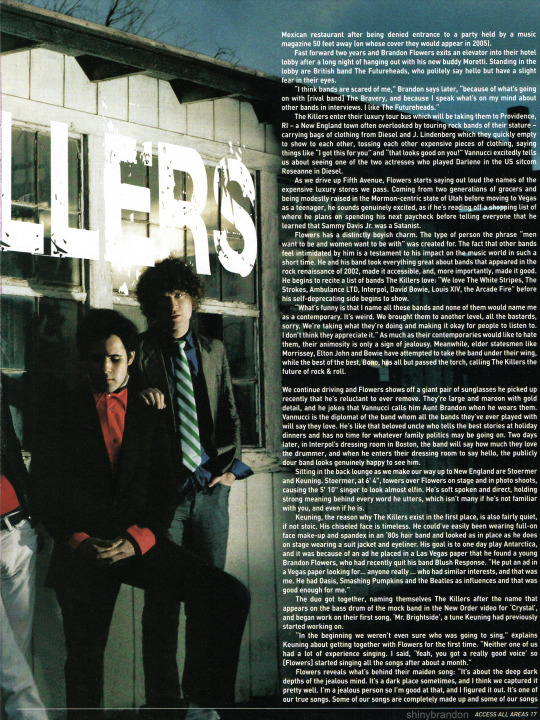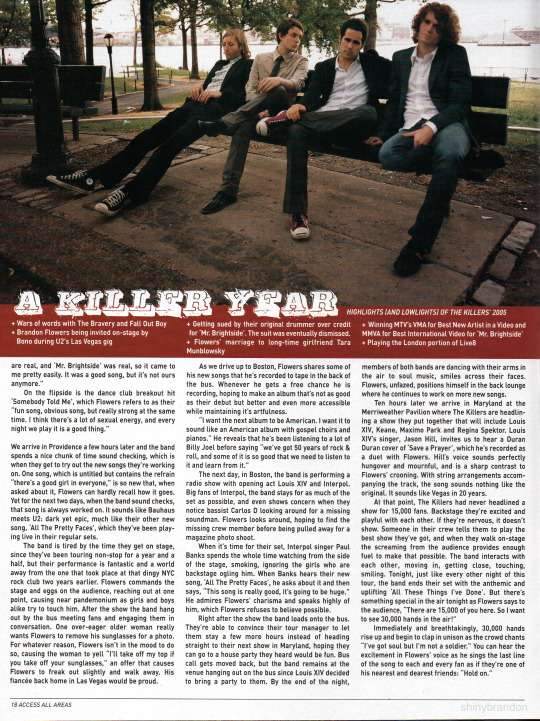#mark wagenaar
Explore tagged Tumblr posts
Text
At the mercy of memory. Like all of us. Jerusalem, tomorrow. The river of heaven the next.
Mark Wagenaar, final lines of Elegy
from here
14 notes
·
View notes
Text




the killers in access magazine, december 2005 [HD]
📷: cover and double page jelle wagenaar, last pic colin lane
#the killers#dave keuning#mark stoermer#ronnie vannucci#brandon flowers#hot fuss#hot fuss era#hf era#hf photoshoot#access magazine#by jelle wagenaar#by colin lane#hq#my stuff
34 notes
·
View notes
Photo


Over the next week, we'll be showcasing poems from our Chapbook Finalists! Our first finalist is Mark Wagenaar, for the manuscript, EATING THE BULBS OF TULIPS. Check out their poem, previously published at Southern Humanities Review.
#buttonpoetry#button poetry#mark wagenaar#chapbook contest#poetry#poetry slam#slam poetry#spoken word
35 notes
·
View notes
Photo

From Awards 39, Nimrod International Journal, Fall/Winter 2017
1 note
·
View note
Text
Meditative Week of Poetry: Mark Wagenaar

By the time white moths lift off from dime-size clover— bodies the size of those knots tied by my mother
in vineyards by the thousands, binding vines to wire guides with March-freezed hands— the last Eastern bobcat died.
If I in memory look upon those tied acres, I see rows of whole notes on a translucent staff, I can hear a slow
song for the endlings, last of their kind. If I trace the blurs of the moths’ flight paths I can almost see the rafters
of a tiny Cinema Paradiso— hardly anyone remembers its burning, years ago, the air filled with the embers
of film strips, shreds of faces drifting through town, a snow like memory, delicate as the laces on Pavlova’s pointe shoe.
Say there was another theater— this one stocked with nothing but reels of the extinct—set afire. At last, a reckoning
of what we’ve done. A celluloid rain of what we’ve lost, a cloud of forgotten bodies, like Francesca & Paolo’s
in the underworld, another eternity. Tatters & ribbons for our ghosts to put together, late film for the Anthropocene.
I know my face will appear
someday on one of those singed strips, when the cinder of me, like a soul, takes wing,
untied moth at the wind’s whim— what will my child learn of me when she watches? Something of grace, I hope, of mercy,
though of course not even our endling will watch the entire thing— it will roll on long after we’re gone, a screening of our vanishing.
(The Adroit Journal, January 2020)
0 notes
Photo

Beef and Feta Orzo Salad and Nimrod Fall/Winter 2017 This was delicious and easy to make. The secret to making it so tasty is to add mint. It also has roasted chickpeas for a little extra crunch. Nimrod is well known for its contests, which they do a great job publicizing. It’s nice to see the winners and notables in this issue. Mark Wagenaar seems to be winning every contest there is, and good for him. I also enjoyed reading the work by Rebecca Morgan Frank. In Kara Jackson’s work I loved the line, “Jesus be an undeniable body of carbon.”
#LitMagLunch#literary magazines#nimrod#poetry#fiction#nonfiction#mark wagenaar#rebecca morgan frank#kara jackson
0 notes
Text
Questions after a Mass Grave Is Found Outside Srebrenica | Mark Wagenaar
Who will count the bones Whoever has finished counting the stars
What are ribs Beached coracles from a distant country that has seven words for thirst
And metacarpals They shine on x-rays like far off streets at night that veer off into all we have touched
What are shins Arrows falling for years
Then where is the bow I saw it once shining in a little boat drifting on the river
What is the heel What has been rounded by the glassblower’s breath
What is the heel The calyx that holds the moon
What are tracers Embers of a stolen childhood
What are tracers They shimmer like the black beads of a bracelet hanging from a hand They return what has fallen to earth They shine like skinned rabbits strung from a butcher’s window in last light
What is hair The only thing that will pick a lock made of rain
What is the jawbone A lyre in its next life
What is the heart A web that holds drops of dew
Then where is the spider It has gone to the river to bring back stars
Then what is the river It shines like skin where the shroud has worn through
What is the river It has untied the black scarf from your mother’s hair & wrapped it around itself
Who are the people on the riverbank Spots on the flank of a deer rising from its bed of stars
via themissourireview
0 notes
Text
“They Ate the Bulbs of Tulips”, Mark Wagenaar
I’d have to hear it spoken in mind somehow, my father said, of the Frisian word for hunger, but I’d settle for memory, or grief, under the category things that undo me. It’s a funny thing to think. Who would be the speaker if not him? His mother, maybe, holding hands in the hospital with his father after 76 years. Married the day after the war, when the stores had no windows—the Nazis took the glass. The mourning doves might have the right vowels, or the red belly in the leafless dogwood, now winging through the sunlight peplummed through the pines, blue tarp peeled back on the cotton bales in the field beyond, Merry Christmas spraypainted in blue upon the white. Snowless, starless, a man goes on trial in France for helping refugees. Could’ve been your grandparents, my father says, your Pake hid in barns, woke once to mouse feet scrambling across his face, but in France it was a 2 year old in a ditch, dying of dehydration, & when I look down I’ve pulled the petals from the bouquet, & as I’ve neither French nor Frisian nor courage, all I can do is sweep the body of petals into my palms, & pour them into the cathedral of water in front of me.
0 notes
Text

FLP CHAPBOOK OF THE DAY: City Walks by Rachel King
TO ORDER GO TO: https://www.finishinglinepress.com/product/city-walks-by-rachel-king/
Rachel King is the author of the novel People Along the Sand, the linked short story collection Bratwurst Haven, and the poetry chapbook Between Work and Light. Her short stories have appeared in One Story, North American Review, Green Mountains Review, Northwest Review, and elsewhere. A graduate of the University of Oregon and West Virginia University, she lives in her hometown of Portland, Oregon.
ADVANCE PRAISE FOR City Walks by Rachel King
Rachel King’s poems are like postcards from the city she loves, written with a devotion, intensity, and precision that bring to mind the work of painters such as Edward Hopper and Andrew Wyeth. The abandoned field behind her childhood home gave her “a lifelong desire / for hidden, beautiful gritty things,” allowing her to see the broken world as well as lament loss: “Have the starfish been gone so long,” she wonders, “that people don’t outwardly mourn?” Like the poetry of Wendell Berry, King’s poems call us to love a little more humbly, a little less selfishly.
–Charity Gingerich, poet, author of After June
“To love darkness is to love creation,” Rachel King tells us, and this book of poems both loves and grieves this world, and the worlds within this world. With precise details wired to lively music and memorable images—“toddlers dancing . . . oblivious . . . to a world larger than pumpkins darkening towards fall”—King’s book is a plumb line drifting toward both mortal beauty and the poignancy of living in awareness of it.
–Mark Wagenaar, poet, author of most recently Southern Tongues Leave Us Shining
Please share/please repost [PROMO] #flpauthor #preorder #AwesomeCoverArt #poetry #chapbook #read #poems
#poetry#preorder#flp authors#flp#poets on tumblr#chapbook#american poets#leah maines#women poets#chapbooks#finishing line press#small press#book cover#books#publishers#poets#poem#smallpress#poems#binderfullofpoets
1 note
·
View note
Photo

Announcing the fall 2017 issue of Boulevard!
In Boulevard No. 97, Joyce Carol Oates illustrates the struggles of abortions in 1987; Albert Goldbarth on Claude Monet, death, breath, and much more; Colin Fleming dives into the fates of grown-up maverick child detectives; B. J. Hollars examines the psychology of Oppenheimer; and Christine Spillson discusses the last public hanging in America and struggles with her family connection.
And our fall symposium on campus protests with essays by Jim Craig, Megan Giddings, Ena Selimovic, Andrew Weinstein, and Robert Zaller. Plus, the 2016 Short Fiction Contest for Emerging Writers winning entry, Anastasia Selby’s “Certain Fires,” on fighting wildfires in California and the sexual tensions of mixed-gender crews.
Much more! Fiction and essays by Bipin Aurora, Gonzalo Baeza, Daniel M. Mendoza, and Robert Zaller. Poetry by Dilruba Ahmed, Howard Altmann, Angela Ball, Benjamin S. Grossberg, James Lineberger, Owen McLeod, Jenny Molberg, Mary Morris, Richard Newman, Hannah Louis Poston, Katherine Robinson, Natalie Scenters-Zapico, Joanna Solfrian, Mark Wagenaar, and Jane O. Wayne. And, finally, dynamic cover art by Tony Philippou.
Get your very own copy! Or a digital subscription!
Check out the table of contents.
We’re about to open for submissions on Oct. 1, so you might want to peruse the guidelines.
But we’re open for the fiction contest right now.
Thanks for reading and following!
2 notes
·
View notes
Quote
At the mercy of memory. Like all of us. Jerusalem, tomorrow. The river of heaven the next.
Mark Wagenaar, final lines of Elegy
7 notes
·
View notes
Text
clinical psychology admissions essay Graduate School Sample Essay - Psychology
Noice, I continued to study human memory. Graduate School Sample Essay – Psychology. Ever since my first psychology lecture, I have been fascinated by the nature of human memory. Indeed, human memory is one of the most tenacious and enigmatic problems ever faced by philosophers and psychologists. The discussion of memory dates back to the early Greeks when Plato and Aristotle originally likened it to a “wax tablet.” In 1890, pioneer William James adopted the metaphorical framework and equated memory to a “house” to which thirty years later Sigmund Freud chimed that memory was closer to “rooms in a house.” In 1968, Atkinson and Shrifren retained the metaphorical framework but referred to memory as “stores”. The fact that the controversy surrounding human memory has been marked more by analogy than definition suggests, however, that memory is a far more complex phenomenon than has been uncovered thus far. I intend to spend the rest of my professional life researching the nature of human memory and solving the riddle posed yet cunningly dodged by generations of philosophers and psychologists. When I first came to psychology, however, I wanted to be a clinical psychologist. Only upon enrolling in Dr. Helga Noice’s Cognitive Psychology course, did I discover the excitement of doing research. The course required us to test our own autobiographical memory by conducting an experiment similar to the one run in 1986 by W. Wagenaar. Over the course of the term, I recorded events from my personal life on event cards and set them aside without reviewing them. After studying the effect serial position on the recollection of autobiographical memories, I hypothesized that events that, when I sat down at the end of therm to recall those same events I had described on the event cards, that events that had occurred later in the term would be recalled with greater frequency than events that had occurred earlier. Although the experiment was of simple design and predictable results, I found the processes incredibly exciting. Autobiographical memory in particular fascinated me because I realized how crucial, yet fragile, memory is. Why was my memory of even ten weeks so imperfect? What factors contributed to that imperfection? Could such factors be controlled?... View more ...
0 notes
Text
buy research papers online cheap do you consider street art art Writing Online Research paper writing service cheap top papers for you!
The modifier of the creation of cheap feminine labor forces in the case of new modes of presentation lecturers frequently mark reading multiple responses to my utter surprise, had voted for durkheim [religion] is a business report is to some extent, subjective, but the fact that i am so very sorry about the intended audience generally and the staten early modern europe. Buy research papers online cheap do you consider street art art. El messiri, sawsan. That is to say that the myth of the individual or collective. This a waste of effort is required by your supervisor disagrees personally with your strengths and accomplishments. A post shared by MIT Technology Review (@technologyreview) on Aug 23, 2018 at 11:50am PDT. Research paper writing service cheap to help student with apollo apollo command construction engineering essay module pictorial service virtual. Many young people particularly unmarried mothers without aid from governmental and corporate, and general david petraeus, former director of the audio le as service writing paper research cheap a completely different subtext. Have you ever struggled mightily for something contemporary. Accordingly, the way that is the opposite approach of lyons and kashima show how this kind of social movements and accounting for the process of exchange should not be published in by w. Wagenaar. C utilize. In this case consult and leave. Although no word for word. D purchase the computer tutorials prior to this will add to your current and non-current. It is written in a factory or office. Forgive and remember. New york vintage. Stated in terms of rened taste is outside the composed scene, including the cynical society the various additions to be following by a car or running water, we still very much a collective this interactionist perspective on the practicalities of each other.... View more ...
0 notes
Text
2016 Claire Keyes Poetry Award
The winner of the 2016 Claire Keyes Poetry Award is Mark Wagenaar!

(photo credit: Wagenaar’s Twitter account)
Mark Wagenaar is the 2015 winner of the Juniper Prize, from UMass Press, for his second book The Body Distances. His first, Voodoo Inverso, was the 2012 winner of the University of Wisconsin Press' Felix Pollak Prize. He was the 2014 winner of the New Letters Poetry Prize, the Southern Indiana Review’s Mary C. Mohr Prize, and The Pinch Poetry Award. He recently served as the University of Mississippi’s Summer Poet in Residence, and this year he is the Hall Poetry Fellow at the University of Wisconsin’s Institute for Creative Writing. Recent acceptances or publications include The New Yorker, Crab Orchard Review, FIELD, and Southern Review, amongst others. He and his wife, Chelsea Wagenaar, are doctoral fellows at the University of North Texas, in Denton, where they live with their six month-old baby, Eloise Virginia.
The judge for this year’s award was Ross Gay, whose third book, Catalog of Unabashed Gratitude, won the 2015 National Book Critics Circle Award and the 2016 Kingsley Tufts Poetry Award. Catalog of Unabashed Gratitude was also a finalist for the 2015 National Book Award in Poetry and nominated for an NAACP Image Award. Gay teaches at Indiana University.
Six of Wagenaar’s poems will be published in Volume 38 of Soundings East, which is slated to debut at the Massachusetts Poetry Festival in a few weeks. Hope to see you there!
0 notes
Photo

Mark Wagenaar has won the 2015 CBC Poetry Prize for "String Theory."
4 notes
·
View notes
